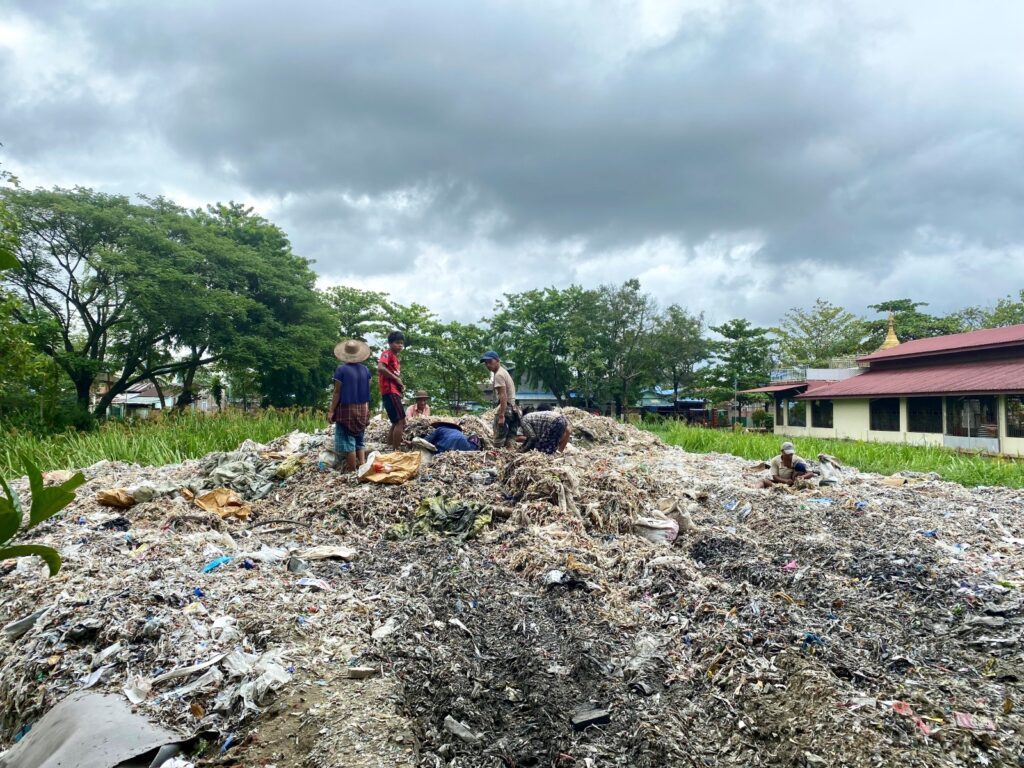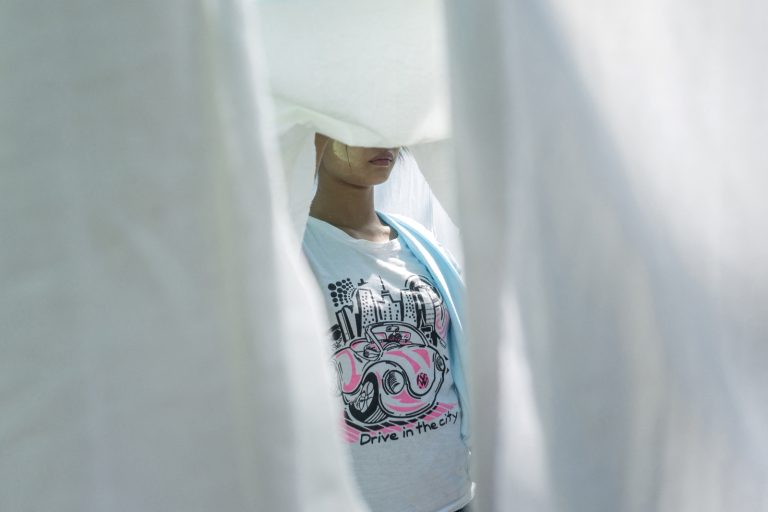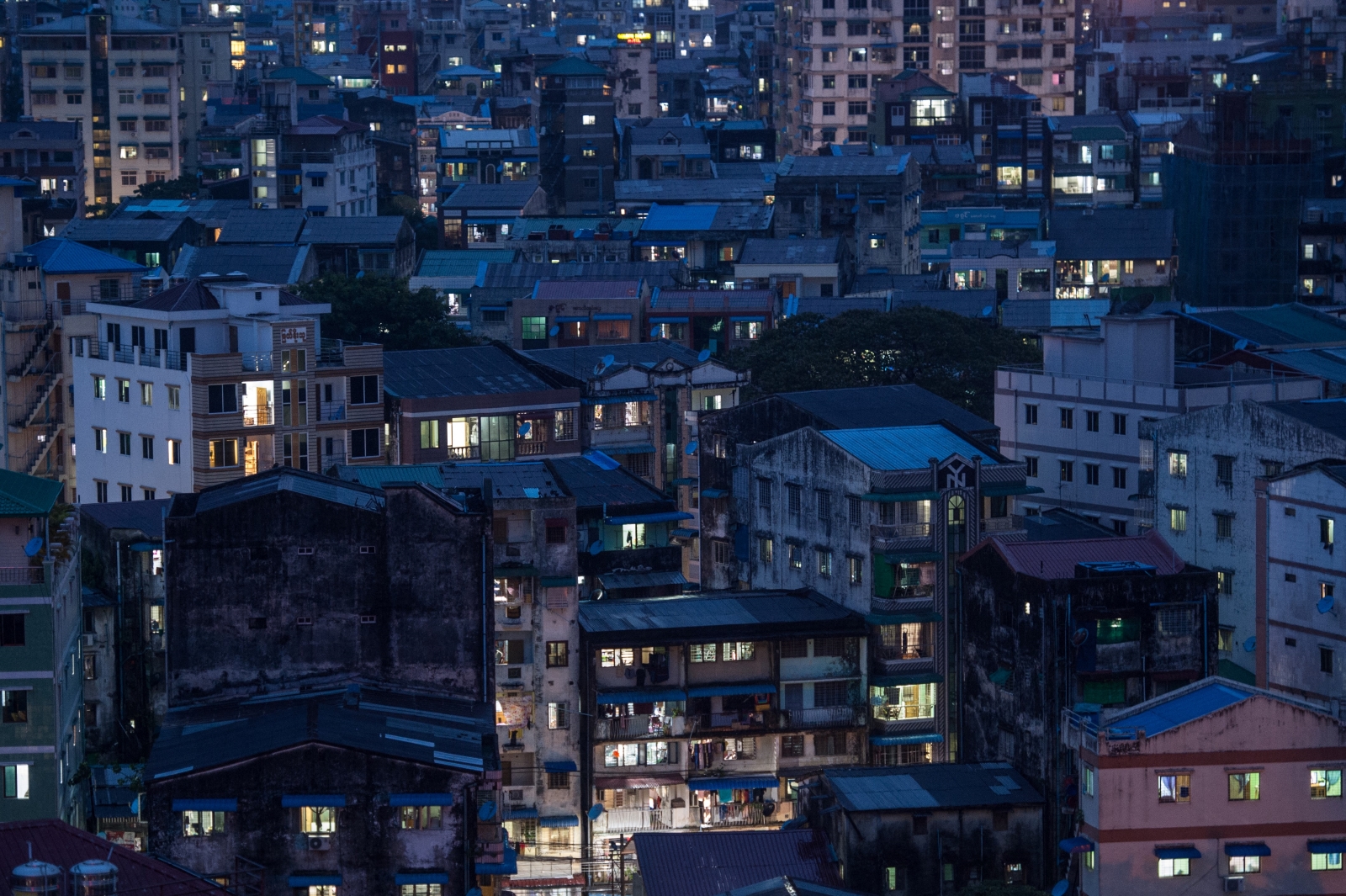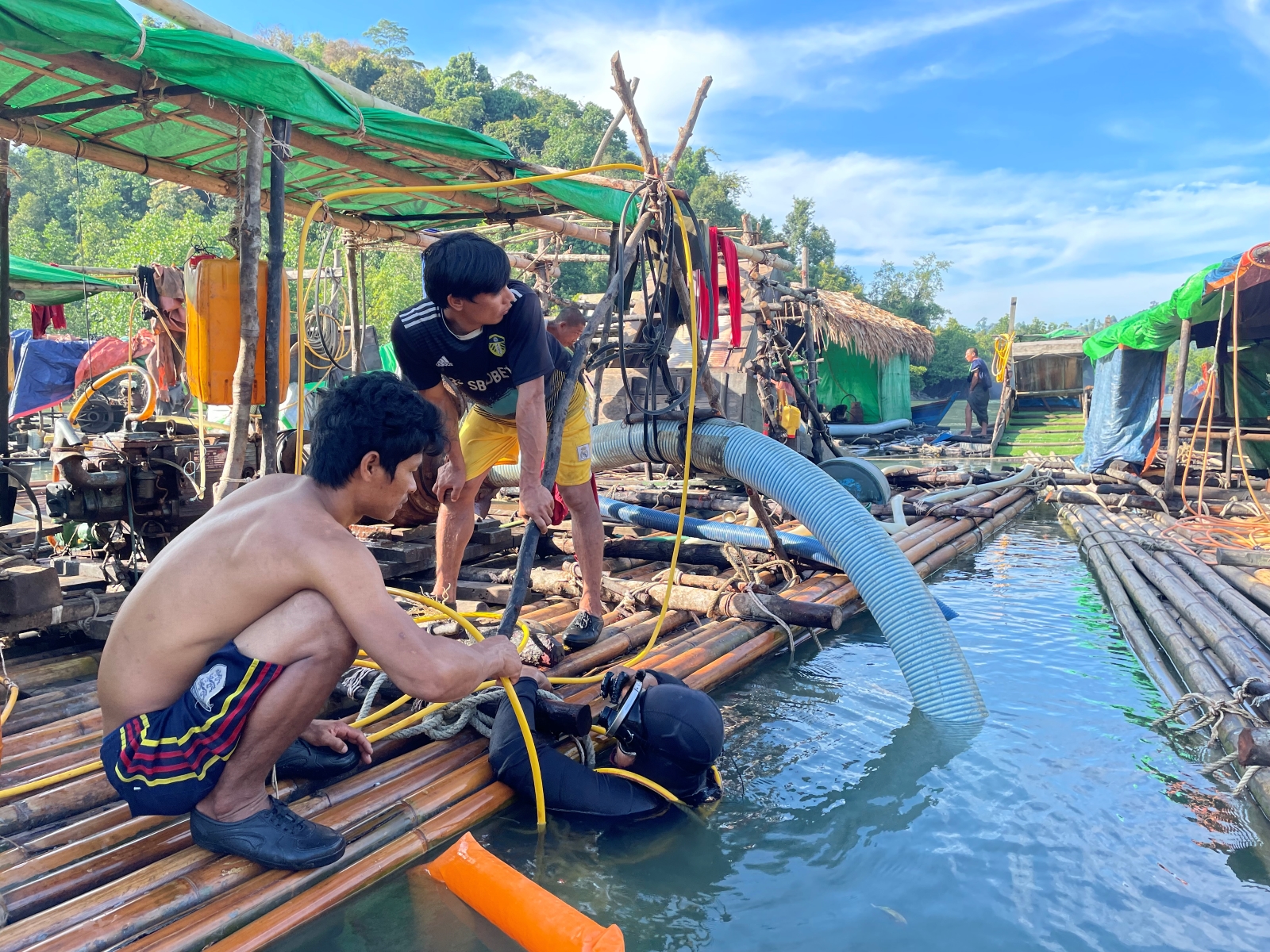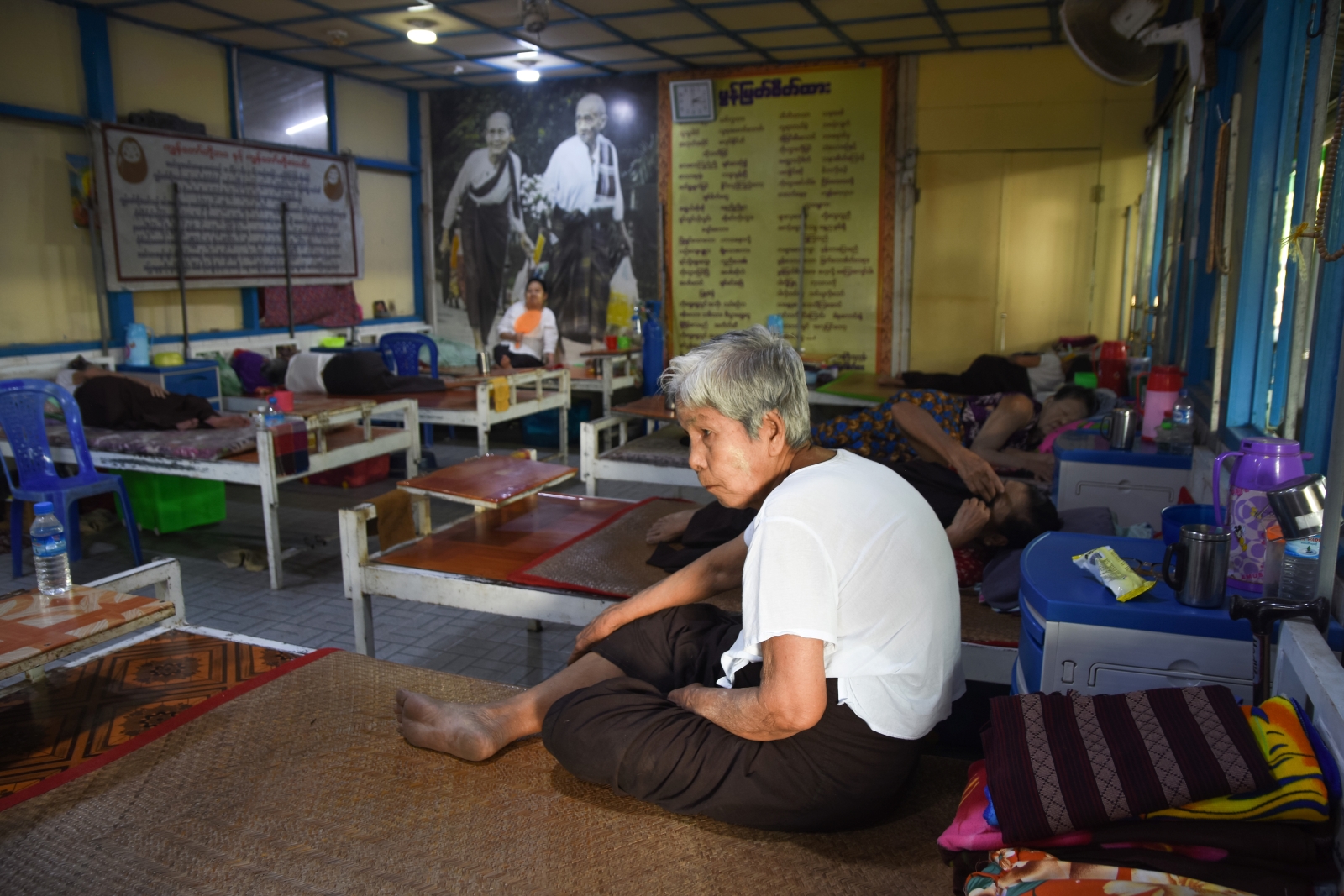Communities in Yangon live surrounded by garbage – blocking doorsteps, piling up in front of windows and clogging water systems. While much of this waste is homegrown, some of it was shipped halfway around the world.
In a six month investigation into the plastic waste trade, Frontier uncovered an opaque global supply chain that is easily exploited by foreign companies. In partnership with investigative newsroom Lighthouse Reports and media organisations in five countries, Frontier found evidence that Myanmar has been used as a dumping ground for wealthy countries and is at risk of being flooded with even more foreign plastic in the coming years.
This article is part one of a two part series. Part two can be found here.
By ALLEGRA MENDELSON and RACHEL MOON | FRONTIER
A stench creeps through the air, carried by a gust of wind from the mountains of garbage piled along the streets of Yangon’s northwestern Shwepyithar Township. Some mounds are over three metres high – as tall as the houses lining the same concrete roads.
“The smell from the dump site is strong. At night, when the doors are closed, the air is sealed out, but if the wind comes in from the east, it’s really bad,” said U Zeya Kyaw Moe*, a resident of Shwepyithar’s 11th ward. “Even adults sometimes find it hard to breathe and it’s very dangerous for young children.”
Zeya Kyaw Moe lives across the street from one trash pile, in a two-storey house with his wife and daughter. He told Frontier the dump site appeared earlier this year and that if it doesn’t move soon, he will.
But not all of this trash originates in Myanmar. Some of it is shipped from countries tens of thousands of kilometres away, by foreign companies searching for easy ways to dump waste that would be costly or impossible to recycle at home.
On multiple visits to Shwepyithar between January and June, Frontier found plastics that didn’t come from Myanmar consumers and aren’t available in local supermarkets, including wrappers and packaging from companies in the United Kingdom, Poland and Canada.
While many local recyclers welcome foreign plastic waste to manufacture consumer goods, the ease with which domestic and international regulations can be circumvented and exploited puts both communities and the environment at risk.
Yet, most Shwepyithar residents who spoke to Frontier said they are terrified of complaining to local authorities, because it might draw attention from the brutal military regime that seized power in a February 2021 coup.
In the two and a half years since, the Myanmar military has launched a campaign of mass violence against dissidents, killing and arresting thousands. Faced with a choice between the military’s wrath and a garbage dump at their doorstep, many Shwepyithar residents have opted to live with the unpleasant smell and health hazards.
The culprit
Shwepyithar wasn’t always a mass dump site. One of Yangon’s more newly-built townships, established in 1986, its name translates to the “gold and pleasant place”. But today it’s anything but, with almost every block polluted by heaps of plastic waste and other trash.
Along with Hlaing Tharyar to its south, Shwepyithar has become one of the former capital’s largest industrial zones. While there are other dumping grounds in Yangon, the township’s unique urban design has made it particularly appealing for those looking to get rid of excess trash.
Mr Jacques Michel*, an environmental researcher on Myanmar, explained that Shwepyithar was designed to have one large green space for every 100 homes – an ambitious plan to encourage outdoor recreation.
However, a lack of money and municipal willpower over the years has left these spaces empty, making them “ideal” for dumping trash, said Michel. Unlike in Shwepyithar, Hlaing Tharyar “has very dense living conditions so there is less empty space and dumping waste is harder,” he added.
The factories sprinkled across Shwepyithar account for large portions of the waste dumped in the community but are not solely responsible.
Among the waste identified by Frontier were wrappers from Lidl, Unico Penne Rigate, Foremost, Kasztelan, Spomlek and Oikos. None of these companies supply goods to Myanmar.
U Htun Khaing*, a plastic recycler and waste importer based in Mandalay, said that he also knows of waste in Myanmar that originated from the US, Japan, Malaysia, South Korea, Australia and, to a lesser extent, Vietnam and some African countries that he couldn’t name.

A spokesperson from Spomlek, a Polish cheese brand, said that they do not export goods to Myanmar and did not know how packing tape from their products ended up in the country. The spokesperson said the company conducts “waste management in accordance with regulations”.
Carlsberg Polska, which produces Kaztelan beer, said that it does not export waste outside of Poland or supply products to Myanmar, and suggested the waste found in the country may have been disposed of by individual consumers.
Canadian companies Unico Penne Rigate and Foremost did not respond to a request for comment. Danone North America, which manufactures Oikos yoghurt, also didn’t respond. Considered one of the world’s top plastic producers, Danone is currently facing a pollution lawsuit in France
The largest quantity of foreign packaging found by Frontier in Shwepyithar came from the UK branch of Lidl, a German-owned supermarket chain with stores across Europe that boasts of having a strong environmental policy.
The Lidl UK packaging was from bulk goods stored in its warehouse that are not supplied to Myanmar. This indicates it was not disposed of by local customers but by the company itself, according to former supermarket employees who reviewed the images.
Despite this, Lidl UK told Frontier that all of the company’s plastic waste “is processed in the UK and Lidl has a strict policy against sending waste or recyclables to any country in Asia”.
Packing tape from Lidl Poland was also found in Shwepyithar. However, a representative from corporate communications at Lidl Poland claimed that the company transfers waste to third parties and each contract has a “provision that the packaging waste will be recycled within the European Union”.
A multi-million dollar trade
But the bits of plastic viewed by Frontier are only the tip of the iceberg. According to United Nations Comtrade data, the largest global trade database, countries reported exporting more than US$70 million worth of plastic waste to Myanmar between 2017 and 2022. That’s 143,000 tonnes of plastic waste – more than 114,000 tonnes of which came from Thailand. While this is only a fraction of the 2,000 tonnes generated within Myanmar every day, it’s a significant sum and has the potential to increase over time if regulations continue to be ignored.
Thailand and Myanmar weren’t always go-to destinations for foreign waste. The torch was previously carried by China – once the single largest recipient of plastic waste, accounting for more than 45 percent of all imports worldwide. However, in 2017, faced with a shrinking waste-recycling industry and an increase in air and water pollution, China announced a ban on importing plastic waste. Searching for a new dumping ground, many exporters turned to nearby Southeast Asia.
As one of the poorest countries in the region and one also notorious for weak law enforcement, Myanmar was an easy choice. During the first year of China’s ban, Myanmar reported a dramatic increase in plastic waste imports, growing from 1,855 tonnes in 2017 to a staggering 71,050 tonnes in 2018. The following year, plastic waste was added to Myanmar’s Negative Import List and the trade was technically banned, but this has had little impact.
Western countries including the US, which had previously been sending an estimated 4,000 shipping containers of garbage to China every day, also rerouted shipments to Malaysia and Vietnam, but both soon introduced their own respective bans on plastic waste imports.
Amid a growing international outcry, in 2021 a plastic waste amendment was introduced to the Basel Convention, the global treaty regulating the international waste trade. All UN member states signed the amendment with the exception of the US, Timor Leste, Fiji and South Sudan.
The new amendment banned the export of hazardous plastic and required that mixed waste only be shipped to countries with the means to adequately dispose of it, and with prior notice.
But in Myanmar the waste is merely being dumped in neighbourhoods like Shwepyithar, and countries continue to ship plastic waste to the country without prior notice.
Frontier found no evidence that companies exporting plastic waste from Canada to Myanmar had sent any notification documents since Canada started tracking exports in 2021. In fact, Canada has issued no permits for Myanmar or Thailand since then, according to Environment and Climate Change Canada, despite exporting 5,900 tonnes of plastic waste to Thailand and nearly 24 tonnes to Myanmar.
Spain also sent more than 470 tonnes of plastic waste to Myanmar last year, according to data it submitted to UN Comtrade, and Frontier found no evidence that Spain sent prior notice ahead of the shipments. Spain's Ministry of Ecological Transition did not respond by press time.
Myanmar’s designated Basel Convention Competent Authority, under the junta-controlled Ministry of Natural Resources and Environmental Conservation, didn’t respond to requests for comment made by phone, email and mail.
The EU introduced its own regulations in 2021, banning the export of mixed or contaminated waste to any country that isn’t a part of the Organisation for Economic Cooperation and Development, a grouping of 38 mostly wealthy countries. The EU is also considering a complete ban on all plastic waste exports to any country.
Mr Jim Puckett, the executive director of the Basel Action Network, a US organisation working to combat the export of toxic waste, said that because Myanmar isn’t an OECD member, “anything coming from the EU to Myanmar that’s used packaging is almost certainly illegal waste trafficking”.
“Governments don’t want to abide by the plastic amendments, there’s just too much money involved – and the powerful sectors of the government choose to look the other way. The UN does all this training for officials on the new plastic waste amendments, but it's not an education problem, it's a money problem, a power problem, a problem of political will,” said Puckett.
Based on UN Comtrade data, there was a decrease in exports after the bans were introduced. During 2021, the amount of plastic waste exported to Myanmar shrunk from more than 13,084 tonnes to around 9,300 tonnes. However, no country has put a stop to the practice, with thousands of tonnes still being shipped to Myanmar every year.
That’s why campaigners say the UN Global Plastics Treaty – which is being negotiated and is expected to be finalised by the end of next year – should ban all plastic waste exports.
“The Basel plastic amendments haven’t worked. Each country needs to take responsibility. [It is] so hypocritical – you should keep it at home. Maybe you should make less,” said Ms Jan Dell, the founder of The Last Beach Cleanup, a plastic pollution awareness organisation based in the US.
“There is no making this better; there is no responsible plastic waste export.”
‘We want more’
While foreign companies are eager to offload their plastic in unregulated environments, local recyclers in Myanmar are also happy to take it, especially as demand for recycled plastic – often cheaper than new plastic – has risen since the coup.
Htin Kyaw Win uses foreign plastic scraps mixed with local raw materials to manufacture polypropylene bags to package rice and beans. U Aung Kyi She*, who owns a recycling factory in Mandalay, uses imported waste to produce plastic pellets – small pieces of plastic used in manufacturing, normally not more than a couple centimetres wide – which he then sells on to other factories.
“In all the discussions we have had with recyclers it is always, ‘we want more foreign plastic waste’. It is cheaper in the long-term, higher quality, easier to use, less dirty, more reliable,” said Michel.
Htun Khaing, who owns two recycling factories in Mandalay, told Frontier that he prefers foreign plastic because it’s “cleaner”.
“We prefer imported waste even though we have to pay more for it. If we use the local waste, there are more steps to washing and cleaning it,” said Htun Khaing.
He explained that while in many countries, plastic water bottles are thrown away after a single use, in Myanmar they are “reused multiple times”. By the time they end up at his factory in Mandalay, a domestic plastic water bottle will require a lot more cleaning – and therefore more time and resources – than one that was imported from abroad.
“If we use the imported waste, we can put it directly into the machine, so the process is quicker and the quality of the products is better,” he said.
Aye Thway Ni*, who owns a plastic factory in Mandalay, said that some of the items she manufactures can “only be produced from foreign raw materials”. She explained that because domestic materials are of “poor quality”, they can only be used to make small items like bottle caps, whereas foreign raw materials can be used to produce entire water bottles.
‘We have no idea what to do with it’
But there are risks to importing plastic. While foreign shipments usually include cleaner and higher quality waste, not every piece is usable, and it's almost impossible to send the lower quality plastic back. Plastic that can’t be used ends up in landfills, waterways or, in the case of Shwepyithar, directly in front of people’s homes.
“For the imported waste, we have to buy the whole container upfront and in the container, there is a lot of mixed waste. So we have to pick some and clean it, and we can’t return the unusable waste, so we have to dispose of it and there’s less profit for us,” said Ko Win Tun Tun*, who works at a large recycling factory in Yangon.
Win Tun Tun said that his factory pays municipal authorities between K60,000-120,000 ($30-60) to “dispose of the waste at landfills”. He said that they normally dump one large vehicle’s worth of plastic garbage every month. Min Hset Myat said that his Yangon-based factory disposes of approximately 10pc of the foreign waste that they import by burying or burning it. “Most of the time we burn it,” he said.
Burning garbage is common in Myanmar but can pose serious health hazards. For instance, when burned, polyvinyl chloride (PVC) plastic, used in a variety of materials from window frames to drain pipes, emits toxic fumes that are linked to breast and other cancers.

“These chemicals are ‘forever chemicals’ known as persistent organic pollutants (POPs). They are globally banned. You are not supposed to do anything that produces POPs because they never go away. When they go into the air, they settle on anything – food, water, anything you take in – then they go into your body and stay there,” said Michel. “PVC is always in these plastic waste mounds – the question is how much.”
Among the foreign plastics found in Shwepyithar, polyethylene (PE) was the most prevalent. Found in plastic bags and most food wrappers, PE is the most commonly used plastic in the world and one that, in its pure form, can be recycled with relative ease. But purity is rare – Michel explained that PE products are often mixed with 10-30pc miscellaneous chemicals that make them much harder to recycle and more dangerous when burned.
“Whenever you burn plastic, you burn this chemical cocktail into the air,” said Michel. “But people burn waste because they have no idea what to do with it.”
Waste is also dumped in waterways and sewers, such as in Shwepyitar’s 27th ward. Daw Aye Mi, who has lived in the settlement since 2018, said that the dumping has become a serious health hazard for the community in the last two years.
“When there is a dump site, people think they can throw their garbage there and they do. After that the garbage floats down waterways to other residential areas. The water becomes dirty and dark. When we touch the water, our legs become itchy,” she said, pointing to sores on her leg, which she said were from bathing in the water.
The lack of awareness about safe disposal is compounded by insufficient oversight and corruption, especially since the coup. Three residents of two wards in Shwepyitar told Frontier that ward officials had pressured them to sign agreements to allow waste to be dumped in their community.
“All residents signed it, so I also signed. I didn’t want to be the only one objecting to it. I wouldn’t dare,” said Daw Thwe Kyi Kyi*, a single mother who works as a food vendor in the ninth ward.
Michel explained that it is not the norm to confront authorities in Myanmar about environmental issues. Even under an elected government before the coup, there was little outcry from affected communities. But there has been far greater reluctance to push back since the military takeover, making Myanmar “the perfect ground for dumping and any other form of exploitation,” said Michel.
“The general fear to speak out about concerns, challenges and issues – the space for that is greatly reduced,” he said. “There is no one people can go talk to and that is why they don’t because there is little trust in the institutions that their concerns are heard so they won’t even try.”
Zeya Kyaw Moe, the 55-year-old resident of the 11th ward, said he proposed that the ward administrator hold a meeting with all members of the community to decide how to manage the waste, but he never heard back and is too afraid to keep pushing the issue.
“In normal times, under a civilian government, this kind of problem would be easy to solve. But now, we’re in a difficult situation if we complain about anything,” said Zeya Kyaw Moe. “No one dares to speak out, so I have to suffer this until I can move. My neighbours advised me not to say anything about the dump site to the administration office, because they’re worried that I will get in trouble.”
“At my age, I can no longer bear being beaten or tortured. I only have my hopes. My mind isn’t strong like when I was young.”
*Indicates use of a pseudonym for security reasons.
Additional reporting by Kyaw Zin, Nandi Theint, Charlotte Alfred, Eva Constantaras, Nalinee Maleeyakul, Mia Rabson and Mariusz Sepiolo.
The production of this investigation was supported by a grant from the Investigative Journalism for Europe (IJ4EU) fund. This article was published in collaboration with Prachatai, The Canadian Press, Front Story, The Independent and Politico.


